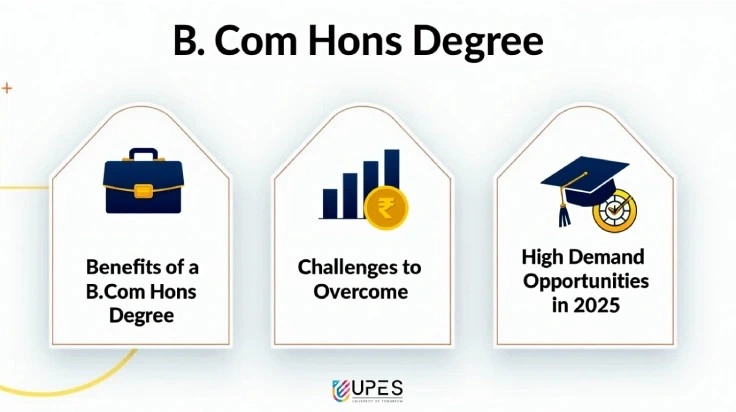Scope and Career Opportunities After the BBA Aviation Management Degree
- UPES Editorial Team
- Published 19/07/2024

In today's fast-paced world, the aviation industry stands as a pillar of global connectivity and economic growth. As air travel becomes increasingly accessible, the demand for skilled professionals in aviation management surges. One pathway to entering this dynamic field is through a Bachelor of Business Administration (BBA) in Aviation Management. This degree not only equips students with foundational business acumen but also offers specialized knowledge crucial for thriving in the aviation sector. In this blog post, we will delve into the scope and career opportunities available after obtaining a BBA in Aviation Management.
What is BBA Aviation Management?
A BBA in Aviation Management is an undergraduate program that blends business principles with aviation industry-specific knowledge. The curriculum typically covers a range of subjects including aviation operations, airport management, airline marketing, and financial management. This degree aims to produce graduates who are well-versed in both the business and technical aspects of aviation, making them highly desirable candidates for various roles within the industry.
Specializations at UPES
At the University of Petroleum and Energy Studies (UPES), students have the opportunity to choose between two specialized degrees under the BBA Aviation Management program:
Aviation Services Operations: This specialization focuses on the management and operational aspects of aviation services. Students learn about flight operations, passenger services, and in-flight service management. The program prepares graduates for roles that ensure the seamless operation of airline services, from check-in to baggage handling.
Travel and Ground Handling Operations: This specialization emphasizes the logistics and ground handling operations within the aviation industry. Students gain knowledge about airport ground services, cargo handling, and logistics management. Graduates are equipped to manage the various ground operations that support airline and airport efficiency.
Why Choose BBA Aviation Management?
Industry Growth and Opportunities
The aviation industry is projected to grow significantly in the coming years. According to the International Air Transport Association (IATA), global air passenger traffic is expected to double by 2037. This growth translates into numerous opportunities for aviation management professionals. As airlines and airports expand, the need for skilled managers to oversee operations, ensure safety, and enhance customer experience becomes paramount.
Diverse Career Paths
Graduates of BBA Aviation Management programs can explore a wide array of career paths. Let's explore some of the top opportunities awaiting BBA Aviation Management graduates.
Airline Management
Airline companies need skilled managers to oversee various aspects of their operations. Roles in this area include:
- Flight Operations Manager
- Revenue Management Analyst
- Customer Service Director
- Route Planning Specialist
Airport Operations
Airports are complex ecosystems that require efficient management. Graduates can pursue positions such as:
- Airport Operations Manager
- Terminal Manager
- Ground Handling Supervisor
- Air Traffic Flow Manager
Aviation Safety and Security
Safety is paramount in the aviation industry. Career opportunities in this critical field include:
- Aviation Safety Inspector
- Security Operations Manager
- Risk Assessment Specialist
- Emergency Response Coordinator
Aviation Consulting
For those who enjoy problem-solving and strategic thinking, aviation consulting offers exciting prospects:
- Aviation Business Consultant
- Operational Efficiency Analyst
- Market Research Specialist
- Sustainability Consultant
Air Cargo and Logistics
The air cargo sector is a crucial component of global trade. Roles in this area include:
- Cargo Operations Manager
- Supply Chain Specialist
- Freight Forwarding Manager
- Logistics Coordinator
Skills Acquired in BBA Aviation Management
Business Acumen
A strong foundation in business principles is a cornerstone of the BBA Aviation Management program. Students learn about financial management, organizational behavior, and strategic planning, which are essential skills for any managerial role.
Aviation Industry Knowledge
Specialized courses in aviation operations, airport management, and airline marketing provide students with an in-depth understanding of the industry. This knowledge is critical for addressing the unique challenges faced by aviation businesses.
Leadership and Communication
Effective leadership and communication skills are vital in the aviation industry, where professionals must coordinate with diverse teams and stakeholders. The program hones these skills, preparing graduates to lead with confidence and clarity.
Technical Proficiency
Technical knowledge of aircraft operations, safety protocols, and maintenance procedures is integral to the curriculum. This proficiency ensures that graduates can make informed decisions and maintain high standards of safety and efficiency.
Conclusion
A BBA in Aviation Management offers a wealth of career opportunities in a rapidly growing industry. With the aviation sector poised for significant expansion, the demand for skilled professionals will continue to rise. This degree not only provides a solid business education but also equips students with specialized knowledge and skills that are highly valued in the aviation industry. For those passionate about aviation and looking to make a mark in this dynamic field, a BBA in Aviation Management is an excellent choice.
Ready to take the next step towards an exciting career in aviation management? Apply online or contact our admissions office for more information.
FAQs
1. What are the eligibility criteria for a BBA in Aviation Management?
Eligibility criteria vary by institution. At UPES, students require qualifying in the Entrance Exam (UPESMET-UG) / UGAT’23/ CUET and Minimum 50% marks in Class X and XII.
2. How long does it take to complete a BBA in Aviation Management?
The program typically takes 3-years to complete.
3. Can I pursue higher education after completing a BBA in Aviation Management?
Yes, graduates can pursue higher education such as an MBA in Aviation Management or other related fields to further enhance their career prospects.
4. What is the job outlook for aviation management professionals?
The job outlook is positive, with increasing demand for aviation management professionals due to industry growth and expansion.
UPES Editorial Team
Written by the UPES Editorial Team
UPES Admission Enquiry
Subscribe to UPES Blogs
Join our community for exclusive stories, insights, and updates
By clicking the "Subscribe" button, I agree and accept the privacy policy of UPES.


















































